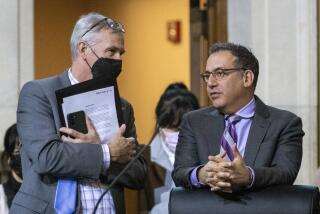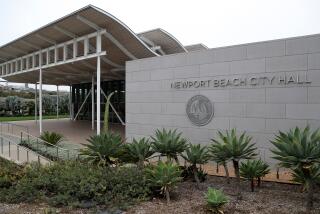Mayors’ Panel Split on Reagan Tax Plan
- Share via
ANCHORAGE, Alaska — President Reagan’s proposal to limit the tax deductibility of business-lunch expenses got a boost Saturday when a committee of the U.S. Conference of Mayors rejected a resolution opposing the limit.
However, the 26-member Urban Economic Policy Committee overwhelmingly opposed two Reagan proposals--it urged Congress not to stop general revenue sharing to state and local governments, and opposed a halt to deductions for state and local taxes on federal personal income taxes.
The committee is part of the 53rd annual U.S. Conference of Mayors, which started Saturday. Committee resolutions will be voted on by the entire gathering of about 180 mayors near the end of the conference, on Wednesday.
Mayors of several large cities, many of whom are not in attendance, have opposed the limit on business lunch expense deductions, contending that it could shut down some restaurants and other businesses that depend on entertaining businessmen for part of their income.
But a majority of the committee followed the lead of Mayor Dianne Feinstein of San Francisco in rejecting a resolution opposing limits on the deductions. She said that mayors have to show they are willing to support at least some effort to reduce the huge federal deficit.
New Orleans Mayor Ernest Morial, president of the mayor’s conference and sponsor of the resolution opposing the lunch and entertainment limit, presented a study done in December for the National Restaurant Assn.
It predicted that a 50% limit on tax deductibility in 1986 would cause a nationwide employment decline of about 140,000 jobs, mostly in the restaurant industry.
A big issue for cities is Reagan’s proposal to halt deductions for state and local taxes on personal federal income tax returns. That could raise an estimated $30 billion for the federal Treasury but could make voters less likely to approve increases in local taxes.
‘Disavowal of the Cities’
“I would have to say the soft underbelly of the Administration has been its disavowal of the cities . . . especially the cities with problems,” Feinstein said.
“I think the tax proposal confirms that,” she said. “It jeopardizes our bond interest rates and prevents one from deducting local taxes. The local taxes are really the things people want the services for most. People really do want the Fire Department funded and the police and transit systems.”
Mayor James B. McNulty of Scranton, Pa., said that eliminating the local deduction would amount to “a tax on taxes.”
More to Read
Sign up for Essential California
The most important California stories and recommendations in your inbox every morning.
You may occasionally receive promotional content from the Los Angeles Times.













